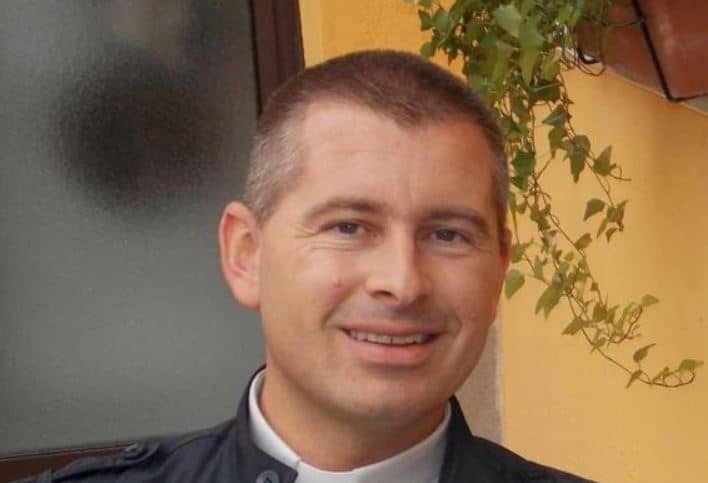ROME – Pope Francis has defrocked an Italian priest accused of sexual liaisons with young but over-age girls reminiscent of former Italian Prime Minister Silvio Berlusconi’s infamous “bunga-bunga” parties, though the priest insists he’s innocent and claims he’s being targeted for his theological views inspired by the 19th century philosopher and spiritual writer Antonio Rosmini.
The Diocese of Modena in northern Italy, just north of Bologna, issued a statement Friday indicating that ex-Father Fernando Bellelli, 42, had been informed of the decision that day. His dismissal from the clerical state was decided, the statement said, by the pope following an investigation by the Vatican’s Congregation for Clergy, and “cannot be appealed and does not allow for any form of recourse.”
The statement did not provide any details of the charges against Bellelli, other than indicating “it does not include criminal charges, either canonical or civil, regarding minor persons, but fundamental aspects of the priestly life.”
“A Church penalty is always imposed in view of a greater good, both for the affected party and for the entire Christian community,” the diocese said. “Fernando Bellelli is not excommunicated; he remains in communion with the Church as a baptized brother in Christ.”
Bellelli had been the pastor in Portile, a small town of roughly 2,000 people about 40 minutes from Bologna.
According to local media reports, sometime before 2015 a group of local parents and parishioners had reported Bellelli to the police, accusing him of inappropriate relationships with young girls who were, nevertheless, adults, including what they described as “psychological submission.”
A police investigation, according to those reports, was closed without any charges being filed.
Nevertheless, in 2014 Bellelli was forced to resign as the pastor when banners began appearing around his church saying, “This is the parish of bunga-bunga and of love.”
In Italian context, the term bunga-bunga evokes memories of a scandal that exploded around Berlusconi in 2010, when a 17-year-old Moroccan belly dancer and alleged prostitute named Karima El Mahroug – known among her Italian friends as Ruby Rubacouri, or “Ruby the Heartstealer” – claimed she had been paid $10,000 by Berlusconi, a real estate and media tycoon in addition to his political career, to give private parties at his villas.
Among other things, El Mahroug claimed that she and other young girls would perform traditional African dances in the nude known as bunga-bunga with Berlusconi, who was 74 at the time.
Berlusconi was convicted of paying for sex with an underage prostitute in 2013 and sentenced to seven years in prison, though that conviction was overturned a year later.
According to Friday’s statement from the Diocese of Modena, a canonical procedure against Bellelli was opened in 2016 and eventually reached the Vatican’s Congregation for Clergy, setting the stage for the pope’s decision for laicization.
Bellelli put out his statement late Friday, saying he accepts the pope’s verdict but describing the charges against him as “completely unfounded and declared as such” as well as “unjust.”
“I consider them above all an attack on my theological ideas and currents,” Bellelli said.
He didn’t specify which theological ideas he felt were problematic, and in general Bellelli doesn’t have a high profile in Italian theological circles. However, Bellelli wrote his doctoral dissertation on Rosmini and, up to now, has been the founder and director of a “cenacle” dedicated to Rosmini’s spirituality in the Italian region of Emiglia-Romana.
Though today he’s a candidate for sainthood, having been beatified under Pope Benedict XVI in 2007, Rosmini was a deeply polarizing figure in his lifetime.
In his famous 1848 work The Five Wounds of the Church, Rosmini identified the most grave challenges facing the Church of his day as he saw them:
- The division of the people from the clergy in worship due to
ignorance and the use of Latin. - The defective education of the clergy.
- The disunion of bishops due to territorialism, nationalism and wealth.
- The nomination of bishops by the secular power (rather than by
election). - The enslavement of the Church by riches due to the long shadow of feudalism.
These positions may seem unremarkable today, but at the time they generated enormous backlash, and left Rosmini under a cloud. In 1887, 22 years after Rosmini’s death, the Holy Office issued a decree Post obitum in which 40 “propositions” lifted from Rosmini’s work were condemned. For example, Rosmini was accused of favoring “ontologism,” a sort of philosophical form of pantheism.
While the “propositions” largely had to do with the mystery of God and creation, the politics of the 19th century hovered in the background, especially Rosmini’s openness to Italian unification against defenders of the temporal power of the papacy.
It wasn’t until 1984 that the Vatican began reevaluating Rosmini, culminating in a decree in 2001 that the motives that led to his 1887 condemnation “can now be considered superseded.”
Bellelli may feel, therefore, that some tensions generated by Rosmimi a century and a half ago, memories of which still run deep in Italian ecclesiastical circles, now attach to him.

















